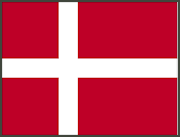Denmark in Space
 DTU Space - Denmark's national space institute - is a world leading institute in several fields due to a unique interaction between science, technology and applied research. There are 190 employees at DTU Space. We have more than 50 years of experience with space science. DTU Space participated in more than 100 international space missions. We work with both ESA and NASA and a number of national space organizations, universities and private companies. Each year we contribute to about 200 scientific articles and publications.
DTU Space - Denmark's national space institute - is a world leading institute in several fields due to a unique interaction between science, technology and applied research. There are 190 employees at DTU Space. We have more than 50 years of experience with space science. DTU Space participated in more than 100 international space missions. We work with both ESA and NASA and a number of national space organizations, universities and private companies. Each year we contribute to about 200 scientific articles and publications.
Denmark is a small country that has difficulty financing space missions with its own funds alone. Therefore, Danish space research takes place through international collaboration agreements. Denmark has been a member of the ESA since 1975, which makes it possible to implement and participate in more ambitious projects.
Denmark does not have its own space organization, so membership of ESA is handled by the Ministry of Education and Research. The ministry employs approximately five employees with ESA membership, but in order to be continuously updated on the interests of Danish researchers, the ministry uses experts from Danish universities as external delegates to ESA's committees and commissions.
Denmark contributes DKK 200 million to ESA every year, and there is Danish participation in most of ESA's programs. Half of these funds go to the compulsory programs, which include the scientific program. The Ministry of Education and Research decides where the rest of the funds are to be used, which is done after advice from the Minister's Space Research Committee before ESA's ministerial conferences. Denmark has participated in almost all of ESA's non-mandatory programs over time, but with a special focus on Earth observation and manned spaceflight, as well as to a lesser extent telecommunications and technology programs. The overall purpose of the Space Research Committee is to provide qualified professional advice to the Minister of Education and Research on Danish competencies, interests, priorities and strategic considerations regarding the utilization of the Danish ESA membership and on how Denmark utilizes Space in Horizon 2020.
DTU Space is Denmark's research, development and competence center within the space area. The core of DTU Space's activities is research into the development of systems, methods and instruments for satellites, and aircraft and Earth observatories, as well as their use to study physical conditions and processes on Earth and in space.
DTU Space seeks to utilize Danish high-tech business potential and create new opportunities within the industrial business utilization of space, e.g. by strengthening Danish companies' benefits from membership of the European Space Agency (ESA) through collaboration with Danish research institutions and Danish industry.
The department's goals are to be an international leader in several fields and to have a handful of professional lighthouses that can profile the department internationally. That this is the case is documented by the international research evaluation of the department in 2012, which ranks DTU Space in international top class in the following research areas: Earth's gravitational and magnetic field, measurement of sea level and ocean dynamics, detectors and telescopes for measuring hard X-rays, instrumentation in connection with space navigation, the influence of cosmic radiation on the climate, electrical discharges in the upper atmosphere, geophysical and mathematical modeling as well as radar and radiometer measurements of the Earth's surface.
The department is characterized by a close interplay between technological and scientific research and has thereby achieved an exceptional international impact with its research in the entire knowledge value chain from scientific and technological basic research over model development and measurement technology to concept and industry standard development.
The combination of the technical-scientific and scientific competencies enables the department within selected areas to develop and deliver unique "end-to-end" solutions, ie. that the department can both develop the necessary instruments and methods as well as utilize the data obtained. This success is based on the department's large academic scope, combined with a number of international core competencies.
DTU Space's eight professional departments are all based on core competencies, which are based on many years of effort: A typical satellite project is more than 10 years in the making. The return on the long-term investment is a successful project that provides insight and data for many years of research that helps to profile DTU as an international elite university.
DTU Space is reaping the benefits of long-term efforts in several major satellite projects: The department has the scientific leadership of two major ESA missions and is an instrument PI or Co-PI on a number of other international space missions carried out in collaboration with ESA or NASA.
In Denmark, there are a total of eight universities, four of which are involved in space research and technology development through ESA projects. These four are; University of Copenhagen, Aarhus University, Technical University of Denmark and Aalborg University. At the same time, the Danish Meteorological Institute, DMI, handles the Danish EUMETSAT membership.
In addition to the efforts from the Danish universities, there are a number of companies that supply equipment and expertise to ESA. The majority of the tasks solved for ESA in Denmark take place through 4-5 companies, but a total of 15-20 companies are involved in ESA's work.
|
NEWSLETTER
|
| Join the GlobalSecurity.org mailing list |
|
|
|

